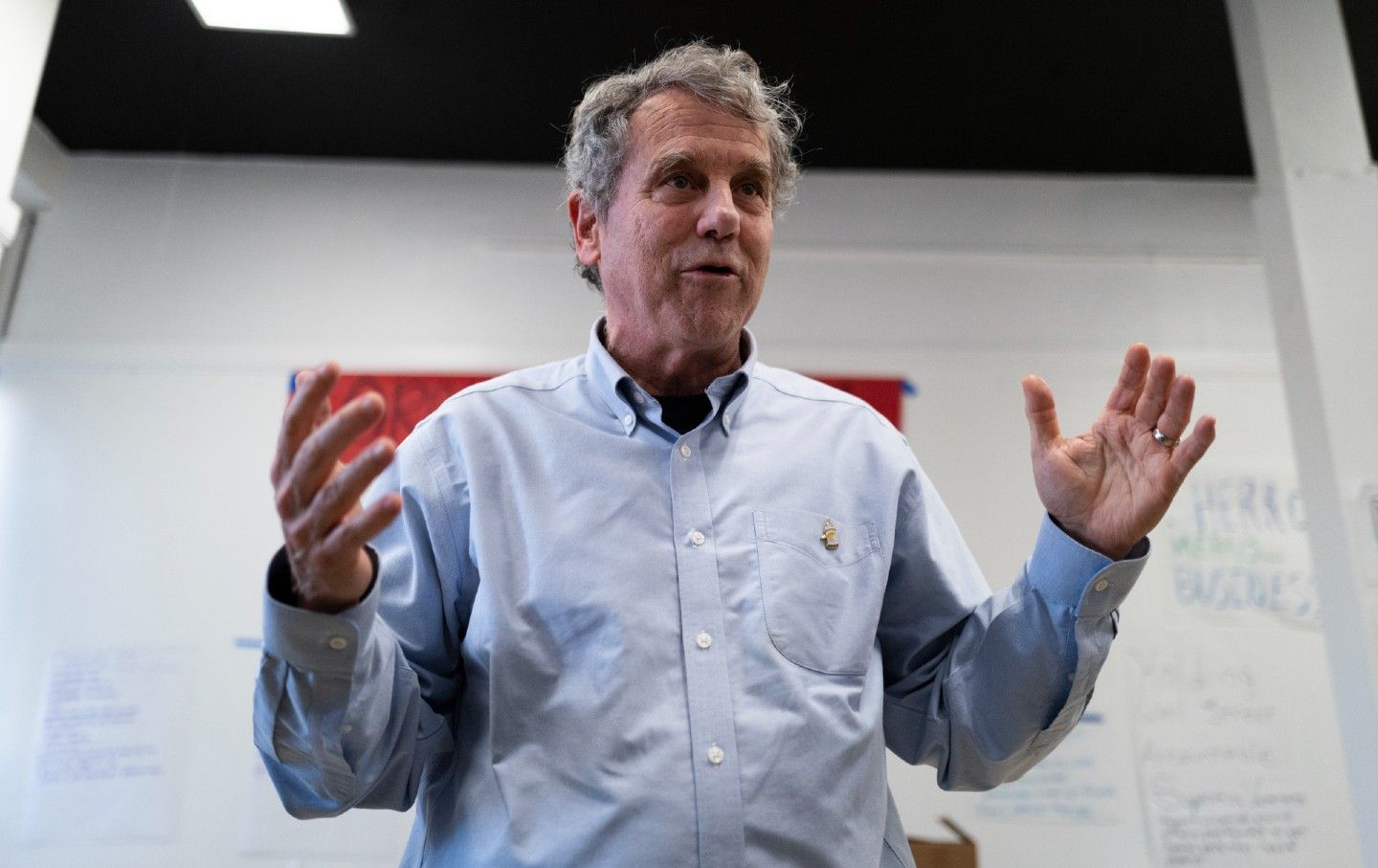Politics
/
March 18, 2025
Against the radical, if reactionary, experiment run from the White House, everyone from Democratic leaders in Congress to MSNBC hosts have turned to the defense of institutions.

Before they became sycophants of Donald Trump, American conservatives revered the writings of Edmund Burke, the 18th century Anglo-Irish philosopher and parliamentarian, who penned a famous takedown of the French Revolution. Burke “aligned himself with institutions of order and stability (and tradition) when he sensed chaos, mob rule or radical experimentation,” according to historian Drew Maciag, “when those who sought power acted irresponsibly or unjustly.”
Today, most Democrats—and quite a few progressives—sound a similar alarm. They charge that the president, abetted by Elon Musk and his eager young DOGEiacs, are wrecking federal institutions established in the 1960s (like JFK’s US Agency for International Development and LBJ’s Medicaid) and even as far back as the 1930s (such as FDR’s National Labor Relations Board). They fire tens of thousands of workers without cause, and imperil benefits many Americans have taken for granted. Meanwhile, with help from the courts, Trump is doing away with affirmative action, DEI programs, and the civil rights of transgender people. Blasting away at “the climate hoax,” he and his party are rapidly eliminating any environmental program that limits the development and use of fossil fuels. And don’t forget Trump’s pardon of every January 6 lawbreaker who committed one of the most blatant attempts at “mob rule” in US history.
In protesting these outrages, liberals and many leftists have become the new conservatives. Against the radical, if utterly reactionary, experiment being run from the White House and cheered on by the MAGA faithful, everyone from Democratic leaders in Congress to the hosts at MSNBC—and even some writers for magazines like this one—resort to an anxious defense of prominent institutions. Last month, Elie Mystal hailed independent regulatory agencies like the Securities and Exchange Commission as “the only real day-to-day check on unrestrained capitalism in our system of government,” while Chuck Schumer recently blasted the idea of abolishing the Department of Education by executive order as “one of the most destructive and devastating steps that Donald Trump has ever taken.”
Essential as it is to defend institutions that millions of Americans need, that alone will not address why so many working-class people—particularly, but not only, white ones—have soured on both partisan Democrats and on some causes left activists fought to win, or gains they seek to preserve. Although immigration did much to make the United States a wealthy and powerful nation, most ordinary citizens now believe Trump’s charge that “illegal” migrants threaten their jobs and culture. Only when progressives demonstrate that they care deeply about their constituents’ current and future well-being will the decent truth have a chance to break through the wall of lies. An effective political strategy must always be grounded in collective self-interest.
We have to think anew about how to win the trust of Americans who have good reasons to be cynical and angry about the current state of the nation. Just repeating the same rhetoric from the past, while simply defending agencies they know little about, won’t respond to that mood or respond effectively to the current crisis.
One approach would be to highlight programs like pre-kindergarten for all kids and tax credits for childcare that Republicans killed in the cradle when Biden was president. Another would be to champion ideas that would have wide appeal—but have never been attempted: class-based affirmative action and subsidies for rent in urban areas. And how many people not named Musk or Bezos would oppose Elizabeth Warren’s “wealth tax” on the 75,000 richest Americans which the Massachusetts senator predicts would raise close to $4 trillion in a decade?
Current Issue

Any chosen policy ought to offer a fresh approach to narrowing the gap between classes and be available, like Social Security, to everyone regardless of need. The animating vision might be borrowed from the chorus of Bruce Springsteen’s 2012 song:
We take care of our own
We take care of our own
Wherever this flag’s flown
We take care of our own.
One can wish that nationalism would fade away, sometime in the future. But as long as most Americans identify with and want to be proud of their country, a nationalism of caring is the best alternative to the nativist scare-mongering of the MAGA mogul. Anyone whose embrace of Trumpism derives primarily from a hatred of immigrants or transgender people will be beyond the reach of this strategy. But surveys and exit polls from last fall’s election show that anxiety about the economy was far more common than fears about cultural displacement.
One cause of the discontent so evident among working-class Americans during this century will be among the most difficult—and also the most essential—to address. How will they and their children find occupations that offer an adequate income and some potential for improvement in an economy that already doles out vastly greater rewards to those with at least a college degree in a technical, scientific, or financial field? As artificial intelligence turns “good” jobs in manufacturing and health care into menial ones—or eliminates them altogether—more and more people will have to take low-paid positions in service or retail that require a relentlessly sunny demeanor that can actually breed resentment and cynicism. Part-time workers already hold an increasing number of those occupations. Unions have always had a difficult time organizing the women and men who hold down such jobs; they tend to be temporary workers and do not develop the pride in one’s craft or expertise that promotes a feeling of solidarity among, say, autoworkers or nurses.
Throughout his three terms in the Senate from Ohio, Sherrod Brown paid tribute to “the dignity of work” and won praise as the most stalwart and eloquent champion of unions in that body. In 2021, he sponsored a bill that compelled the federal government to fund multi-employer pension plans that became insolvent. In his final speech on the Senate floor, Brown insisted:
True populism is about the dignity of work—putting workers at the center. And when I talk about workers, I mean ALL workers—whether you punch a clock or swipe a badge. Whether you’re on salary or working for tips. Whether you’re going to school or raising children or caring for an aging parent. No matter who you are, no matter where you live, no matter what kind of work you do—your work has dignity.
Yet Brown, who lost his seat to a wealthy car dealer and tech executive, did not explain how American workers would nurture that sense of dignity while toiling at the kind of low-wage jobs available to most of those with just a high-school education or less. To drive customers around town at all hours, field anxious complaints at farflung call centers, serve coffee and pastries to rushing commuters, or package all manner of items at a massive warehouse does not often allow the simple satisfaction of a job well done, let alone provide a sense of dignity. Yet, as artificial intelligence advances, many of those jobs may not survive either. That an ever increasing share of national income goes to investments instead of wages adds another layer of insecurity to the lack of self-esteem at work. Sadly, few members of Congress show Brown’s steadfast commitment to either the dignity of labor—or to finding serious ways to address the blatant injuries of class.
Politicians and movement activists who do not merely promise to change that reality but make a serious effort to do so deserve admiration as well as electoral and popular success. Otherwise, working-class Americans will probably keep swinging between contempt for politicians in general and a passing fancy for performers who boast without evidence that they know how to make a country rife with division and discontent “great again.”
We may not have it in our power to begin the world over again,” as Tom Paine, Burke’s great antagonist, predicted back in 1776. But by talking consistently and with genuine empathy about how to solve the problem of work in the tech-driven economy—and by coming up with policies that address it—we may be able to turn back the pessimism and despair that grips both the left and the people who will decide its fate, and that of the nation.
More from The Nation

I am livid over the Jewish Trump supporters who are upholding a set of values at odds with the principles that have sustained us.
Dave Zirin


Only genuine change can pull us back from the precipice of environmental collapse.
OppArt
/
Andrea Arroyo

Stanley Milgram would have understood this morally cretinous moment all too well.
Sasha Abramsky

Parts of the online “manosphere” welcomed Trump’s tariffs as a way to bring back men’s work.
Joan Walsh

The pro-Israel New York congressman denounces protester detentions and faces blowback from former funders who are aiding them.
Jacqueline Sweet



